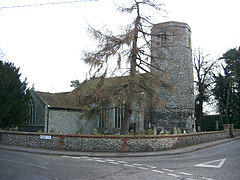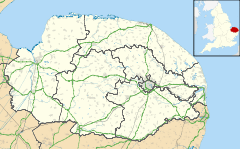| Great Ryburgh | |
|---|---|
 Great Ryburgh St. Andrew | |
Location within Norfolk | |
| Civil parish |
|
| District | |
| Shire county | |
| Region | |
| Country | England |
| Sovereign state | United Kingdom |
| Post town | Fakenham |
| Postcode district | NR21 |
| UK Parliament | |
Great Ryburgh is a village in the English county of Norfolk. Administratively the village is within the civil parish of Ryburgh along with Little Ryburgh, in the district of North Norfolk.
It is located about two miles south-east of the market town of Fakenham. The River Wensum flows through the village. The village has a large maltings which has been producing malt on a traditional malting floor for two centuries.[1] The village and maltings were formerly served by Ryburgh station on the Great Eastern Railway branch from Wymondham and East Dereham to Fakenham and Wells-next-the-Sea. This line is proposed for restoration, as far as Fakenham, by the Norfolk Orbital Railway.
The church of Great Ryburgh St. Andrew is one of 124 surviving round-tower churches in Norfolk.
The Boar Inn is located in Great Ryburgh and is a traditional English country inn, with low-beamed ceilings and an inglenook fireplace in the bar.
An Anglo-Saxon cemetery was discovered in 2016 by a Museum of London Archaeology excavation that was largely funded by Historic England.[2][3] The waterlogged conditions of the site led to the remarkable preservation of burials including 6 plank-lined graves and 81 hollowed tree-trunk coffins dating from the 7th-9th century AD. The evidence is this may have been a community of early Christians, including a timber structure thought to be a church or chapel.
External links
- Website with photos of Great Ryburgh St. Andrew, a Round-tower church
- St Andrew's Church website with extensive local history
- Extensive history and photographs of Gt Ryburgh watermill
- History of Southmylle - Gt Ryburgh's early watermill
- Brief history of Gt Ryburgh's windmill
References
- ^ Pollitt, Michael (24 January 2004). "Norfolk's maltsters to the world" (PDF). Hidden Norfolk. Archived from the original (PDF) on 3 April 2005. Retrieved 9 March 2009.
- ^ "Great Ryburgh dig finds 81 'rare' Anglo-Saxon coffins". BBC News. England. 16 November 2016. Retrieved 16 November 2016.
- ^ "Exceptional Survival of Rare Anglo-Saxon Coffins". Historic England. Historic England. 16 November 2016. Retrieved 16 November 2016.
